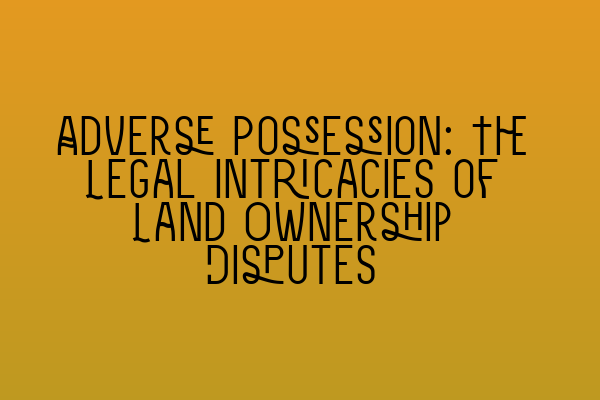Adverse Possession: The Legal Intricacies of Land Ownership Disputes
In the world of property law, land ownership disputes can often arise, leading to complex legal battles and the need for a seasoned solicitor well-versed in the nuances of adverse possession. This legal concept, also known as squatter’s rights, allows a person who does not have legal title to a property to potentially acquire ownership over time through continuous occupation and fulfilling certain requirements.
Adverse possession cases can be both fascinating and challenging, requiring a deep understanding of property law and land registration systems. In this article, we will delve into the intricacies of adverse possession, exploring the key elements required to establish a claim and the potential defenses a property owner can invoke.
Understanding Adverse Possession
Adverse possession is based on the principle that if a person occupies a piece of land without the permission of the legal owner and meets specific criteria, they may acquire legal title to the property. This principle exists to promote the efficient use of land and prevent disputes over land ownership from lingering indefinitely.
To successfully establish a claim of adverse possession, the person seeking ownership must satisfy the following necessary elements:
- Actual possession: The claimant must physically occupy the land and exercise control over it. This means using the land as an owner would, such as erecting structures, maintaining the property, or cultivating the land for agricultural purposes.
- Exclusive possession: The claimant’s possession must be exclusive, meaning that they have exclusive control and use of the land without interference from the legal owner or others.
- Open and notorious possession: The possession must be visible and obvious to anyone who may have an interest in the property. This requirement ensures that the legal owner is given notice that someone else is claiming ownership over the land.
- Adverse possession for a specified period: In most jurisdictions, the claimant must occupy the land continuously and without interruption for a set period of time, typically ranging from 10 to 20 years.
- Hostile possession: The claimant must possess the land with the intent to exclude the legal owner and assert ownership rights. However, it is worth noting that hostile does not necessarily imply malicious intent but rather a claim of ownership despite lacking title.
Meeting these elements can be complex, as each requirement carries its own legal implications and potential challenges. It is crucial to consult with an experienced property law solicitor to navigate these complexities and maximize the chances of success in an adverse possession claim.
Potential Defenses to Adverse Possession Claims
While adverse possession can lead to ownership disputes, it is important to recognize that legal property owners have defenses available to challenge adverse possession claims. Here are some common defenses property owners may invoke:
- Registered title: If the land in question is registered under the Land Registration Act, the registered owner’s rights are protected, and adverse possession claims may face additional hurdles.
- Consent: If the legal owner granted permission or consented to the claimant’s occupation of the land, adverse possession claims may be rendered invalid.
- Defective claim: The legal owner can challenge the claimant’s adherence to the necessary elements of adverse possession, such as asserting that the possession was not continuous or exclusive.
- Interruption: If the legal owner takes action to interrupt the claimant’s possession, such as by erecting a fence or taking legal proceedings to assert their ownership, it may restart the clock for the required period of continuous possession.
These defenses highlight the importance of seeking legal advice promptly if you find yourself involved in an adverse possession dispute. A skilled solicitor can assess the merits of your case and devise the most effective defense strategy based on the specific circumstances.
Seek Expert Legal Assistance
Adverse possession cases can be complex and fact-specific, requiring a comprehensive understanding of property law and land registration systems. At SQE Property Law & Land Law, our team of expert solicitors specializes in handling adverse possession disputes and other property-related matters.
If you are facing an adverse possession claim or believe you may have a valid adverse possession claim, we encourage you to seek our professional assistance. With our expertise and knowledge, we can navigate the complexities of your case, protect your rights, and provide you with effective legal representation throughout the process.
Contact SQE Property Law & Land Law today to schedule a consultation and discuss your adverse possession matter with our experienced solicitors. We are here to guide you through the legal intricacies and ensure the best possible outcome for your case.
- Understanding Contractual Capacity: Rights and Limitations
- Interactive SQE Mock Tests for Contract Law: Test Your Knowledge
- Join Our SQE Contract Law Webinars: Expert Insights and Guidance
- Contractual Capacity: Understanding Legal Competence in Contracting Parties
- Contract Law Reforms: An Analysis of Recent Changes
